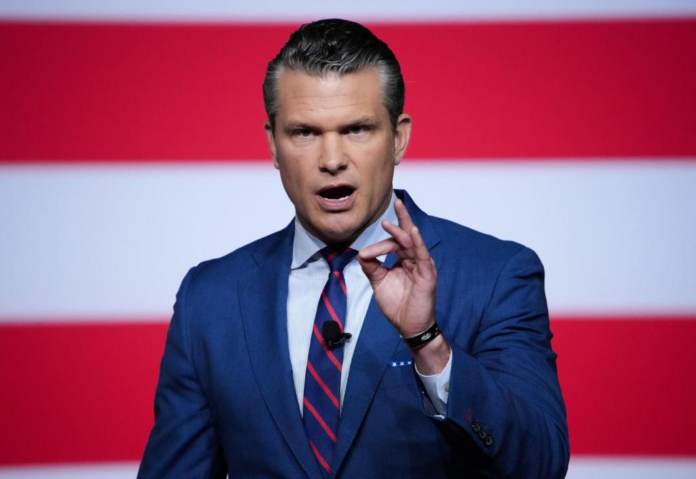A small part of me cheers and feels vindicated whenever I hear Defense Secretary Pete Hegseth talk about the softness of the military. I was once relieved from an Army command after a handful of people complained about my leadership. It didn’t matter that the overwhelming majority of people in our unit supported me or that I had successfully commanded twice before in my career. It didn’t matter that I had spent 52 months in Iraq and Afghanistan or that I had completed some of the most arduous training and served in some of the most challenging assignments the intelligence community offers. It didn’t matter that I had received the highest possible rating on my last six evaluations and received strong evaluations throughout my career. What mattered was that a small number of people described my leadership as toxic and lodged a complaint before ever speaking with me about their concerns. Secretary Hegseth has a point when he talks about an out-of-control complaint system that has commanders walking on eggshells.
Given my personal experience, I might be expected to embrace Hegseth’s style and his call for standards and toughness, but most of what he’s doing won’t make us stronger, and I find myself disagreeing with him far more than I agree.
Hegseth’s fixation on what he calls “lethality” employs the narrowest understanding of the word, and the U.S. military is already the most lethal in history. Our nuclear weapons, advanced aircraft, ballistic missile submarines, cyber warfare tools and combined arms teams can bring devastation to any place in the world. There’s not a foreign country in existence that wants to tangle with the U.S. military.
Hegseth’s belief that our military is rotting from within is peculiar, especially given President Donald Trump’s insistence that our forces remain the best in the world. Even as I once felt let down by a system that put too much weight on the complaints of a few people, I never doubted the strength and capability of our nation’s military, and I never stopped loving the institution or believing in its effectiveness. The system needs reform, but on a scale that runs between solid and rotten, our military remains firmly on the solid side.
Hegseth’s narrow view of lethality and his extraordinary focus on physical fitness seem rooted in an earlier type of warfare. General George Washington might be surprised to see the Army’s current focus on running long distances, and it’s unlikely he ever ran a mile at a time in his life. Generals like John Pershing and George Patton smashed the Germans in Europe but didn’t seem particularly well built for marathons and probably didn’t do many push-ups. Hegseth’s view of physical fitness feels Spartan, as if the job of the American military is to line up in a row with spears and shields and use muscles to push against an enemy who’s pushing back.
Hegseth is right that every American service member should be fit, healthy and strong. Like anything good, however, an emphasis on fitness can be taken too far. We must be careful not to confuse fitness with fortitude. The few soldiers who complained about my leadership were part of a unit that prioritized physical fitness but couldn’t hold up to the pressure of my reasonable demands.
As Hegseth pushes the military to focus on physical fitness and grooming standards, we risk being distracted from the hard and complex tasks at hand. It’s ironic that the newly named War Department is shifting its focus away from war and toward the type of police operations traditionally carried out by law enforcement and the Coast Guard.
As the secretary of war scolds America’s senior military officers for putting on weight, he’s simultaneously directing U.S. military resources toward the Western Hemisphere, shifting advanced fighter jets, naval forces and U.S. Marines into the Caribbean rather than focusing on winning wars against America’s most consequential adversaries.
Redeploying our military forces near our borders endorses the idea of a multipolar world with distinct spheres of influence. Accepting these spheres abandons the idea that American interests exist everywhere, so American power must retain preeminence in every region of the world. This was the view embraced by the Department of Defense, which recently recommitted itself to fighting and winning big wars against peer adversaries like Russia and China. The newly named Department of War seems to have a different focus, shifting American resources and attention away from great power competition and toward less existential missions closer to home.
At the end of the conflicts in Iraq and Afghanistan, the U.S. military understood that decades of counterinsurgency had caused our conventional warfighting skills to atrophy. These counterinsurgency fights, which made it difficult to train for conventional conflict, showed that it isn’t easy to do two disparate things well. Either the U.S. military is focused on defeating the armed forces of major foreign nations, or it’s trying to prepare for that mission alongside competing priorities.
Important as these other priorities may be, using the military to address them on anything but a temporary basis degrades its readiness to fight wars against peer competitors. Hegseth understood this when he complained in the past that ancillary tasks were distracting the military from warfighting. He was especially upset by what he believed was a heavy focus on diversity programs. Now, by focusing the War Department on domestic policing and operations in the Caribbean, he risks becoming a proponent of a different set of non-warfighting tasks that are far more distracting than anything he previously criticized.
America should not withdraw from the world, and isolationism has never once in our history brought long-term peace. Avoiding conflict means deterring our adversaries by showing our preparedness for any contingency. The Russians and the Chinese aren’t particularly concerned about how fast our soldiers run or their maximum number of pushups. They’re concerned about the health of our alliances, the speed of our procurement programs and our willingness to remain engaged on the world stage. That’s where the secretary of war should focus his attention.
Given my experience with the Army’s complaint process, I appreciate Secretary Hegseth’s commitment to restoring a sense of balance to that system. Doing so will make our military better. America won’t be safer, however, if he reshapes the military into an institution composed of clean-shaven men at the peak of physical fitness who are overly focused on countering crime in America and policing our borders. Fitness matters, but staying engaged with the world matters more.



